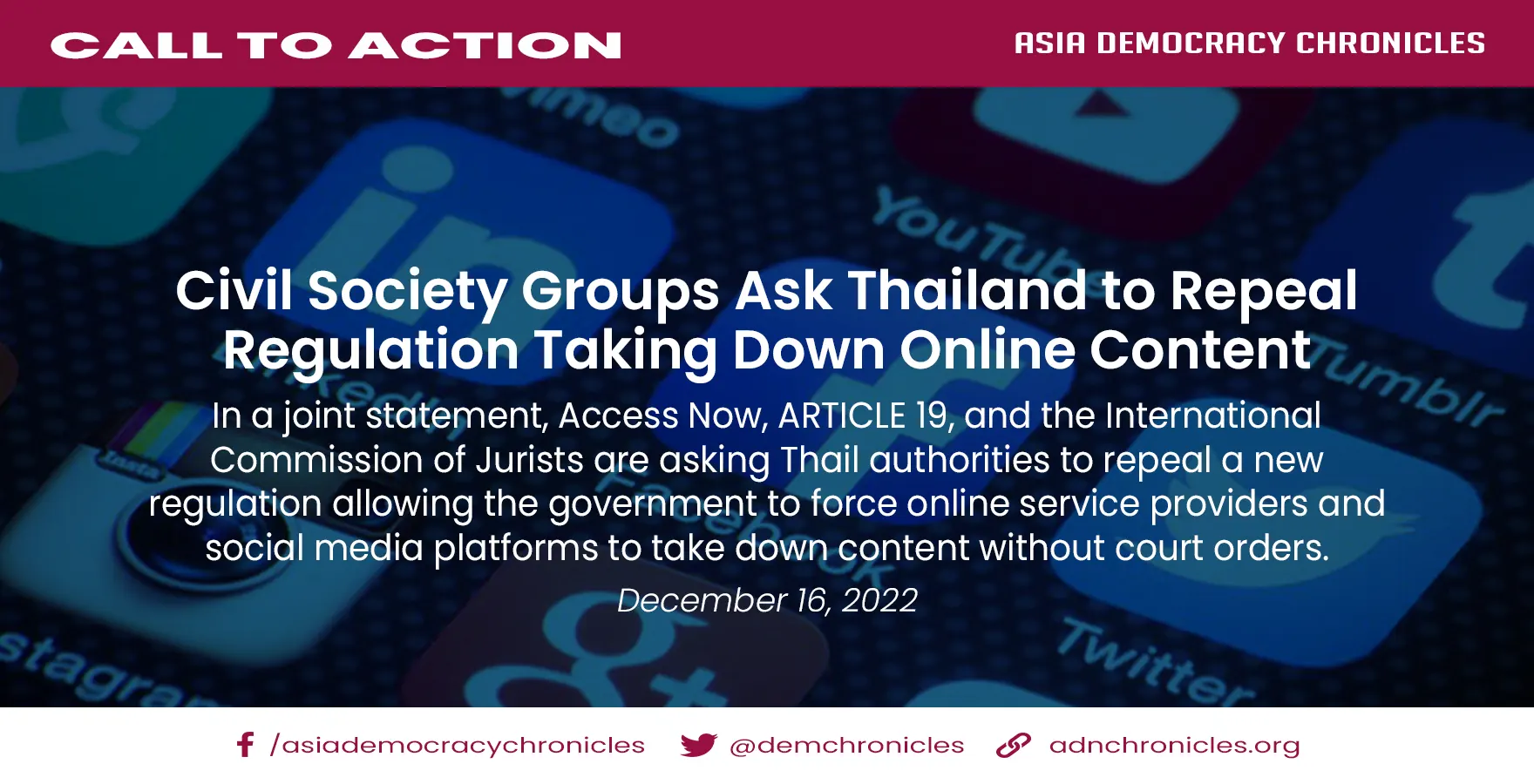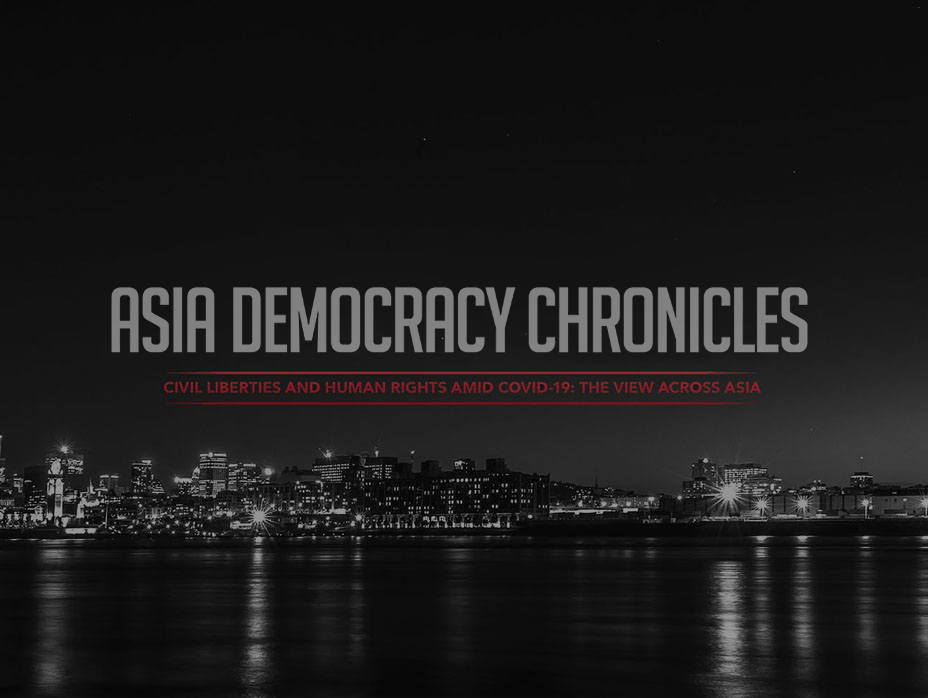|
Getting your Trinity Audio player ready...
|
16 December 2022
The Thai authorities must repeal a new regulation allowing the Thai government to force online service providers and social media platforms to take down certain content without a court order, said Access Now, ARTICLE 19, and the International Commission of Jurists (ICJ) in a joint statement today.
Our organiations express serious concern that the provisions of this regulation, which will come into force on 25 December 2022 and was issued by the Ministry of Digital Economy and Society (MDES), are aimed at unjustifiably expanding the powers of the Thai government to arbitrarily restrict online expression without sufficient judicial oversight. The new deadlines for compliance with content takedown orders from the MDES – which may be as short as 24 hours – are unreasonable and not compliant with international law and standards.
The granting of this broad authority is likely to result in online expression and information being arbitrarily curtailed even beyond the excessively expansive interferences already allowed under the existing Thai legal framework. Restrictions on freedom of expression that are this overbroad contravene Thailand’s international human rights obligations under the International Covenant on Civil and Political Rights (ICCPR). The rules also fail to adhere to the Manila Principles on Intermediary Liability, which hold that content should not be required to be restricted without a judicial order, and that requests for restriction of content must be clear, unambiguous, and follow due process.
Expansion of executive powers to restrict content
Under the new regulation, officials designated by the Minister of Digital Economy and Society (DES) will be granted new powers to directly compel online service providers and social media platforms to take down content they deem to violate the Computer-related Crimes Act B.E. 2560 (CCA) within strict timeframes.
Content deemed by the officials to be “false computer data” that might damage “the protection of national security, public safety… or cause panic to the public” under Section 14(2) of the CCA or constitute “an offence against the security of the Kingdom or is an offence relating to terrorism” under Section 14(3) of the CCA must be taken down within 24 hours. False or distorted data that might “cause damage to the public” under Section 14(1) of the CCA must be taken down within seven days, under Clause 8 of the regulation.
We regret that the regulation gives even more powers to the Thai government to restrict content pursuant to the CCA, a law which is non-compliant with Thailand’s human rights obligations. Our organizations have repeatedly denounced the overbroad and vague nature of Section 14 of the CCA, which has been impermissibly used to sanction free expression, including of critical and dissenting opinions. The Special Rapporteur on the promotion and protection of the right to freedom of opinion and the Special Rapporteur on the situation of human rights defenders of the Human Rights Council have also raised concern over the use of Section 14 of the CCA to criminalize the legitimate exercise of freedom of expression in Thailand. These provisions are inconsistent with the principles of legality, legitimate purpose, proportionality and necessity under article 19(3) of the ICCPR.
Lack of sufficient judicial oversight
The regulation gives new powers to the officials designated by the DES Minister – who are executive and non-judicial actors – to bypass the courts and unilaterally demand online service providers to take content down. This will undermine the rule of law, the role of the courts as a safeguard against executive or legislative overreach, and is inconsistent with the requirement under international human rights law that States should only restrict content pursuant to an order by an independent and impartial judicial authority.
The regulation also places new procedural hurdles for affected users and online service providers to meaningfully exercise their right to appeal against content takedowns. Under Clause 11, online service providers, social media platforms, and affected users may submit an appeal to the Permanent Secretary of the Ministry of DES or their designated person within 30 days. In effect, this results in a self-checking process embedded in executive control, to the extent that the appeal is being determined by the Ministry that issued the restriction in the first place. This runs contrary to the rule of law principle and the requirement that there should be an appeal procedure provided “by a competent judicial authority”.
Although the regulation is silent on an express right to appeal to an independent and impartial judicial body, it is likely that affected users, online service providers and social media platforms can approach the Administrative Court to ask for the MDES’s decision to be struck down if they find the appellate result under Clause 11 unsatisfactory. However, Clause 10 also provides that any pending appeal “shall have no mitigation on the order”. Such proceedings can take years to come to a conclusion, which will subject appellants to lengthy and stressful judicial and administrative proceedings for merely exercising their right to freedom of expression online. There is also no indication of a remedial mechanism to consider allegations of violations of human rights in this context.
Unreasonable timeframe for content takedown
The mere one-day timeframe for content removals is especially draconian where there has been no judicial authorization of takedown orders. The deadline for compliance places unreasonable time pressures on platforms to respond, incentivizing them to err on the side of caution, and remove some online expression that is protected under international human rights law rather than challenge the orders, so as to avoid potential criminal sanctions. Our organizations have previously pointed out that similar content takedown regimes in Indonesia and Vietnam push platforms to “comply-first-evaluate-later”, which increase the risk of online censorship.
Failure to comply with this timeframe may result in sanctions for the online service provider and social media platform that are inconsistent with the principles of necessity and proportionality. For instance, under Clause 9 of the regulation, failure to comply with the content takedown order may lead to the presumption that the service provider is “cooperating, consenting or acquiescing” to the perpetration of a Section 14 offence. This may result in imprisonment of up to five years, a fine not exceeding 100,000 Baht (approx. USD 2,850), or both. Failure to comply may also result in the revocation of providers’ operating license by the National Broadcasting and Telecommunications Commission, under Clause 16. These risks of overcompliance or executive overreach are exacerbated by overbroad provisions under the CCA, which do not provide platforms, executive authorities or individuals using the internet with clear and narrowly defined limitations on what online content is permissible, as highlighted above.
Need to reverse course
In light of the aforementioned concerns, our organizations urge the Thai authorities to repeal or substantially amend the new regulation in order to comply with Thailand’s obligations under the ICCPR and rule of law principles. Content takedown orders must be narrowly tailored to achieve a legitimate aim in line with the ICCPR and must follow due process principles, including by being issued by an independent judicial authority. We also urge the Thai authorities to repeal or substantially amend all other laws and regulations that are not compliant with international human rights law, including the CCA.
Background
The new regulation grants new powers to the officials designated by the DES Minister to compel online service providers and social media platforms to take down content within a strict deadline deemed to be in violation of Section 14 of the CCA. Section 14 of the CCA provides for criminal lability, in the name of combatting alleged false information online, the following conduct:
- With ill or fraudulent intent, putting “into a computer system distorted or forged computer data, partially or entirely, or false computer data, in a manner that is likely to cause damage to the public, which is not a defamation offence under the Criminal Code” (Section 14(1));
- The “entering of false computer data” which is “likely to cause damage to the protection of national security, public safety … or cause panic to the public” (Section 14(2));
- Any data entry which is “an offence against the security of the Kingdom or is an offence relating to terrorism under the Criminal Code” (Section 14(3)); and
- Any data entry which is “obscene and that computer data may be accessible by the public” (Section 14(4)).
These offences are punishable with up to five years’ imprisonment, a fine of up to 100,000 Baht (approx. USD 2,850) or both. Section 14 of the CCA has been wielded alongside criminal defamation provisions to crack down on a range of protected online expression, enabled by the vagueness of these legal provisions.
In February 2021, the Criminal Court informed MDES officials that a new guideline would be developed, which would require the target of the content removal or blocking to be summoned to an inquiry before the court orders the restriction of online content. It is likely that this requirement will be scrapped, since the MDES can now directly order content takedowns without going through the courts at all, obviating the need for an inquiry process.
Article 19 of the ICCPR obliges Thailand to respect and ensure to all individuals under its jurisdiction the right to freedom of expression and information. The UN Human Rights Committee has clarified in its General Comment No. 34 that protections for freedom of expression and opinion should extend to “political discourse, commentary… on public affairs, discussion of human rights, journalism…”, including through non-verbal means and “electronic and internet-based modes of expression.”
While in certain circumstances, a State may restrict freedom of expression, any such restriction must be strictly limited in accordance with the ICCPR. They must meet the requirements of legality, legitimate purpose, necessity, proportionality and non-discrimination.
The UN Special Rapporteur on the promotion and protection of the right to freedom of opinion and expression has made clear that States should only seek to restrict content pursuant to an order by an independent and impartial judicial authority, and in accordance with due process and standards of legality, necessity and legitimacy.
Section 34 of the 2017 Constitution of Thailand provides that a person shall enjoy the liberty to express opinions, make speeches, write, print, publicize and express by other means. Section 35 provides that a media professional shall have liberty in presenting news or expressing opinions in accordance with professional ethics. #
Source: https://www.article19.org/resources/thailand-content-takedown-regulation/



















